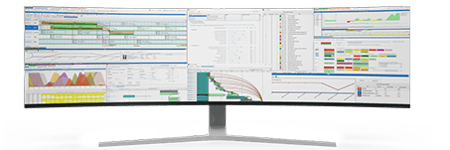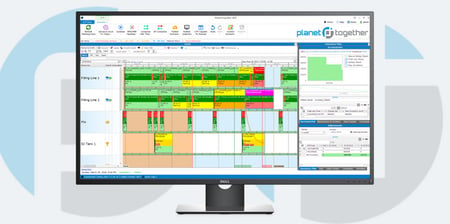Navigating Economic Pressures and Market Shifts
Pharmaceutical manufacturing is a critical industry that continuously evolves to meet global demand for life-saving drugs. In recent years, this evolution has been significantly impacted by economic pressures and market shifts. Rising costs of raw materials, regulatory changes, increased competition, and shifting consumer demands have placed immense pressure on production planners in pharmaceutical manufacturing facilities. As the frontline managers of scheduling, production planning, and resource optimization, production planners must find ways to navigate these economic challenges efficiently.
A key strategy to cope with these shifts is embracing advanced technologies and software integration to enhance planning accuracy, improve resource utilization, and minimize costs. One such technological enabler is PlanetTogether, a world-class advanced planning and scheduling (APS) software. By integrating PlanetTogether with enterprise systems like SAP, Oracle, Microsoft, Kinaxis, or Aveva, production planners can gain a competitive edge, streamline operations, and meet the demands of a dynamic market.
In this blog, we explore how integration with PlanetTogether helps pharmaceutical manufacturers respond to economic pressures and market shifts while optimizing production.

Economic Pressures in Pharmaceutical Manufacturing
The pharmaceutical industry has always been under pressure to maintain quality while optimizing costs. However, recent market trends have amplified these challenges. Some of the most significant economic pressures include:
Rising Costs of Raw Materials: The cost of active pharmaceutical ingredients (APIs) and other essential raw materials has been on the rise due to supply chain disruptions, geopolitical tensions, and inflation. Pharmaceutical manufacturers must find ways to mitigate these costs while maintaining production levels.
Regulatory Compliance: The pharmaceutical sector faces stringent regulations from agencies such as the FDA, EMA, and other global regulatory bodies. Complying with these regulations adds complexity to production planning, requiring precise scheduling, documentation, and tracking, which can increase operational costs.
Increased Competition: As more companies enter the pharmaceutical market, competition intensifies. Generic drug manufacturers, in particular, are increasing market competition by offering lower-cost alternatives. This forces traditional manufacturers to either reduce costs or differentiate through innovation.
Global Supply Chain Challenges: Pharmaceutical manufacturing often relies on a global network of suppliers and contract manufacturers. Recent disruptions due to pandemics, geopolitical instability, and logistics challenges have led to unpredictable lead times and supply shortages, putting pressure on production schedules.
Demand Volatility: Shifting consumer demands, driven by changes in health trends, pandemics, and breakthroughs in personalized medicine, have led to fluctuating demand for certain drugs. Production planners must be agile to respond to these unpredictable market shifts, ensuring that they have the capacity to ramp up or down production as needed.

Market Shifts Impacting Pharmaceutical Production
In addition to economic pressures, several key market shifts are reshaping the pharmaceutical manufacturing landscape:
Personalized Medicine: The rise of personalized medicine has transformed pharmaceutical manufacturing from mass production to more specialized, smaller-batch production. This shift necessitates flexible production planning to accommodate a wider variety of drug types with shorter production runs.
Increased Outsourcing: To reduce costs and mitigate risk, pharmaceutical companies are increasingly outsourcing various stages of the manufacturing process. This shift requires seamless coordination between in-house operations and external partners, which adds complexity to production planning.
Sustainability Initiatives: There is growing pressure from consumers, regulators, and investors for pharmaceutical companies to adopt more sustainable manufacturing practices. This means optimizing resource use, reducing waste, and investing in energy-efficient technologies.
Digital Transformation: The pharmaceutical sector is experiencing a wave of digital transformation, driven by the need for more efficient operations and better decision-making. This transformation is supported by the integration of data-driven technologies and advanced software solutions that improve planning and operations.


The Role of PlanetTogether in Addressing These Challenges
PlanetTogether’s advanced planning and scheduling (APS) software is designed to help pharmaceutical manufacturers optimize their production schedules, reduce costs, and improve overall efficiency. By integrating PlanetTogether with enterprise resource planning (ERP) systems like SAP, Oracle, Microsoft, Kinaxis, or Aveva, production planners can unlock powerful capabilities to navigate economic pressures and market shifts.
Here’s how PlanetTogether integration can make a significant impact:
Enhanced Production Visibility
Integration between PlanetTogether and ERP systems such as SAP or Oracle provides pharmaceutical manufacturers with real-time visibility into every aspect of their production processes. This visibility enables production planners to respond quickly to supply chain disruptions, material shortages, and demand changes, minimizing downtime and ensuring continuous production.
For example, when demand for a specific drug spikes unexpectedly, PlanetTogether's integration with SAP allows for the quick adjustment of production schedules to meet the new demand while balancing existing commitments. This level of flexibility is crucial in maintaining operational efficiency in a volatile market.
Optimized Resource Utilization
Economic pressures demand that pharmaceutical manufacturers make the most efficient use of their resources. PlanetTogether’s APS software, integrated with ERP systems like Microsoft or Oracle, enables production planners to optimize the allocation of resources, including labor, equipment, and materials. The system considers factors such as machine availability, maintenance schedules, and operator skill levels to create an optimal production plan.
This results in reduced downtime, increased throughput, and minimized costs. Moreover, by integrating with Microsoft Dynamics 365 or other similar platforms, production planners can ensure that scheduling decisions align with broader business goals, such as sustainability targets or inventory reduction initiatives.
Improved Regulatory Compliance
Regulatory compliance is non-negotiable in the pharmaceutical industry. Integrating PlanetTogether with ERP systems such as Aveva or SAP helps ensure that every production schedule adheres to regulatory requirements. The system enables detailed tracking of production batches, including the materials used, equipment status, and operator actions, providing the necessary documentation for regulatory audits.
In a highly regulated environment, this level of precision can significantly reduce the risk of compliance issues, which could otherwise result in costly fines or production delays.
Supply Chain Resilience
Integrating PlanetTogether with supply chain management solutions like Kinaxis enables pharmaceutical manufacturers to create more resilient supply chains. By leveraging real-time data from across the supply chain, production planners can proactively identify potential bottlenecks or disruptions and adjust production schedules accordingly.
For instance, if a key supplier experiences delays, the integration between PlanetTogether and Kinaxis allows production planners to quickly reallocate resources or adjust delivery timelines to avoid halting production. This proactive approach is vital in maintaining consistent output in the face of global supply chain challenges.
Demand Forecasting and Flexibility
Economic pressures often come in the form of unpredictable demand shifts. By integrating PlanetTogether with demand forecasting tools available within ERP systems like SAP or Oracle, production planners can better anticipate these fluctuations and adjust their schedules accordingly. This ensures that production capacity is aligned with market demand, reducing the risk of overproduction or stockouts.
For example, when a new personalized medicine treatment is approved, demand for the drug may surge unexpectedly. PlanetTogether, integrated with SAP’s demand planning module, allows production planners to adjust their schedules dynamically, ensuring that the manufacturing facility can meet this demand without sacrificing the production of other essential drugs.

The Competitive Edge of PlanetTogether Integration
As economic pressures and market shifts continue to reshape the pharmaceutical industry, production planners must adopt innovative strategies to maintain competitiveness. The integration of PlanetTogether with systems like SAP, Oracle, Microsoft, Kinaxis, or Aveva offers a robust solution that empowers production planners to:
- Improve production flexibility and agility
- Optimize resource utilization and reduce operational costs
- Enhance visibility into production processes and supply chain dynamics
- Maintain regulatory compliance with greater ease
- Proactively respond to demand changes and market volatility
By leveraging the power of advanced planning and scheduling through PlanetTogether, pharmaceutical manufacturers can navigate these challenges more effectively, positioning themselves to thrive in a rapidly changing environment.
The pharmaceutical manufacturing industry is facing unprecedented economic pressures and market shifts. For production planners, navigating these changes requires a combination of advanced technology, strategic planning, and operational agility. By integrating PlanetTogether with leading ERP systems like SAP, Oracle, Microsoft, Kinaxis, and Aveva, production planners can enhance their ability to optimize production, reduce costs, and respond to shifting market demands.
In this dynamic environment, the companies that invest in integrated solutions and data-driven decision-making will be best positioned to succeed, ensuring not only operational efficiency but also the ability to deliver life-saving treatments to the people who need them most.
Are you ready to take your manufacturing operations to the next level? Contact us today to learn more about how PlanetTogether can help you achieve your goals and drive success in your industry.



